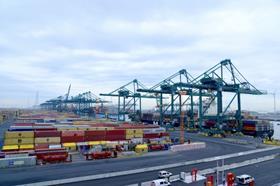
The Port of Antwerp is expecting to confirm a record year for the sixth time in a row, with growth in all types of cargo and driven by a recent wave of investments.
According to the port, the results confirm the port's attraction and further establishes its position as a 'world-class player', while assuring the continuity of the port's role as the 'main engine of the Belgian economy'.
With expected growth of 5.1 per cent compared with 2017, the earlier forecasts of a sixth successive record year have been confirmed.
The expected total freight volume in 2018 stood at to 235m tonnes, a new record, with 'unparalleled growth' in all types of cargo – including the large expansion in container freight, reaching 130m tonnes (up 5.8 per cent) or 11m TEUs (up 5.5 per cent).
Port Authority CEO Jacques Vandermeiren declared: 'With these excellent growth figures and the recent surge of investment, in 2018 the port has once more confirmed its role as the main engine of the Belgian economy. Now we will continue on the same course as before, towards a sustainable port of the future. But to keep growing in a sustainable way, we together with the whole port community must strain every effort to meet the challenges facing us today. The port of the future must have enough capacity and be accessible, sustainable, smart and secure to remain attractive for investors.'
While the new record year and the investment surge together confirm the vitality of the port, they also confirm earlier forecasts that the maximum container capacity will very soon be reached – so that additional container handling capacity is urgently needed.
Port Authority CEO Jacques Vandermeiren outlined the situation: “We are already far beyond the optimum capacity limits in the terminals below the locks, with serious consequences for efficiency. We therefore continue to insist that additional container capacity below the locks is urgently needed.
'The Port of Antwerp is doing very well, which is good news for the economy. But it is also very important to keep up this impetus and to build the necessary capacity as soon as possible.'






No comments yet